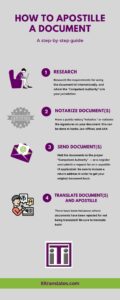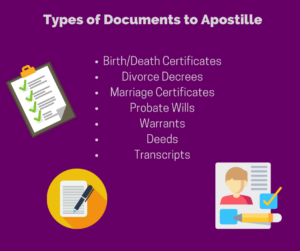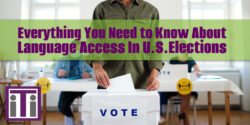
Our translations department often gets asked about notarization and apostilles. These are important questions because these are real concerns of real people.
They are the ones who will be extremely disappointed if a procedural error prevents or delays, for example: visiting a sick relative, applying to study abroad, trying to ensure the correct person has power of attorney, or traveling internationally to work with Doctors Without Borders.
iTi exists because we genuinely want to help people, and the way we do that is by bridging the language gap.
That is why we have decided to put together a Frequently Asked Questions blog to help you decide which route is best as you start the process of translating and authenticating your official documents.
What is an apostille?
An apostille authenticates the seals and signatures on public documents (i.e. birth/death certificates, marriage licenses, estates) for legal use in the 120 countries party to the Hague Apostille Convention of 1961*.
The Apostille Convention created a more streamlined international process for safeguarding against fraudulent public documents.
An apostille, which can be either a seal or a separate piece of paper attached to the original document (called an “allonge”), does not indicate the document is accurate, only that the signatures are valid.
An apostille certifies:
- The signature (s) of a public official (s)
- The capacity in which the public official acted
- If necessary, the identity of the seal or stamp on the document, i.e. a notary public seal
You will need an apostille if all of the following apply:
- The issuing country is party to the Apostille Convention
- The country where the document will be used is party to the Apostille Convention
- The law of the issuing country considers it to be a public document
- The country where the document will be used requires an apostille
The “ABC’s of Apostilles” PDF (on the official website of the convention) recommends checking with the proper officials ahead of time since there may be amendments or exemptions on the apostille requirement, depending on the country.
If a country is not part of the Apostille Convention, official documents will require an Authentication Certificate.
Canada, for instance, is not a signatory. That means it requires two certifications of its public documents, one from the Canadian Ministry of Foreign Affairs and one from the consulate of the receiving country.
The best recommendation is to inquire about your options with the Embassy or Consulate of the country where you wish to use the document.
* Hague Convention Abolishing the Requirement of Legalisation for Foreign Public Documents

What kind of documents do I need an apostille for?
Any official public document that will be used internationally, including, but not limited to the following:
- Birth/Death Certificates
- Divorce Decrees
- Judgments in state court cases
- Marriage Certificates
- Probate Wills
- Warrants
- Deeds
- Transcripts
Is an apostille the same as a notary?
Obtaining an apostille sounds like the same process as notarization, which also serves to validate signatures as a safeguard against fraud. Does that make an apostille the same as a notary?
No. Notarization is a process that involves a “notary public” official overseeing the signing of an official public document and placing a stamp or seal on it that authenticates the signatures. Notarization is used strictly domestically.
An apostille verifies the notarization of public documents and is only needed for international use within countries that are party to the Apostille Convention of 1961.
The process of obtaining an apostille occurs after notarization (notarization is not required for some documents, so check with the proper officials).

Who issues apostilles?
A common question then becomes, ‘Can a notary issue an apostille?’ The answer is, no, a notary public cannot issue an apostille.
Under the terms of the Apostille Convention Treaty, an apostille can only be issued by a “Competent Authority. Some countries have one “Competent Authority” listed while others have several.
In the U.S., apostilles are most-commonly issued by the Secretary of State’s office (of the state where the document originated).
The reason for this is quite simple: The apostille serves to validate the notarization, which means there needs to be a level of separation from the notary public official.
What this means for practical purposes is, if you move out of state and need an apostille for your birth certificate, you must mail the document and request the services be performed by the correct official in your home state.
That is not the case for federally-issued documents, such as FBI background checks, which must be processed by the U.S. Department of State.
According to the U.S. Department of State – Consular Affairs, documents must be apostilled by the U.S. Department of State if signed by the following:
- U.S. federal official
- U.S. consular officer
- A judge advocate (10 USC 1044a), or a foreign consul diplomatic official registered with the U.S. Department of State’s Office of Protocol, or a military notary
This is a much more detailed process than obtaining a notarization, which is done at banks, law offices, tax preparing services, and AAA, among other places.
Notary public officials are more accessible because anyone who is 18 years old, and is either a resident of a state or has a business there, can apply to be a notary.
How do you get something apostilled?
The first thing you need to do is identify the “Competent Authority” in your jurisdiction. Pre-COVID, you could apply for an apostille in-person in some states, but it is recommended that you check with your Secretary of State’s office to determine the best course of action.
Prior to the pandemic, you would generally follow these steps* to obtain an apostille by mail in the U.S.:
- Submit notarized documents to the Secretary of State’s office (of the state from which they originated)
- Complete the Authentication Order Form
- Include the required fee: $40 per authentication; $15 per authentication, if related to the adoption of a child
*according to the Connecticut Secretary of State’s office; requirements and fees vary from state-to-state.
You can also apply for an e-apostille in some jurisdictions, which is highly recommended since the COVID-19 pandemic has affected the in-person and mail processing of apostilles.
An e-apostille is an electronic file that has been digitally signed, which typically involves an Adobe PDF. E-apostilles are currently offered in 38 countries, including 12 U.S. states.
The following states offer e-apostilles:
- Arkansas
- California
- Colorado
- Delaware
- Kansas
- Montana
- New York
- North Carolina
- Rhode Island
- Tennessee
- Texas
- Washington
How long does it take to get an apostille?
In short, longer than it used to. It can take up to 2-3 months to receive an apostille by mail, according to the U.S. Department of State’s website.
We are not breaking news here when we say the delay is due to the COVID-19 pandemic. This process took four business days prior to the pandemic.
The State Department says the following urgent cases allow for scheduled, in-person appointments:
- Life-or-death situations: serious illness, injury, or death of a family member
- Proof of international travel within 48 hours
Do I need to translate my document for an apostille?
Technically, you do not need a document translated beforehand in order to obtain an apostille. However, we recommend doing so because there have been instances of countries rejecting documents that have not been translated.
Plus, given the increased processing times, it would be frustrating to wait that long only to be notified that your document cannot be accepted.
In the U.S., for instance, all public documents must be translated into English to get an apostille.
The next logical question is, ‘Do I need to translate an apostille?’ The answer is no, technically.
According to the Hague Convention’s “ABC’s of Apostilles,” the only requirements are that an apostille should be:
- identified as an apostille
- include the French title of the Convention (Convention de La Haye du 5 octobre 1961)
- include a box with the 10 numbered standard informational items
So, do you need to translate the apostille? No, but again, we recommend being on the safe side.
You might ask: So, how can I get a document and apostille translated? iTi has specialized in custom language solutions for more than 30 years. We have unparalleled turnaround times and 10,000 linguists who can provide support in more than 250 languages.
[iti-button url = “https://www.ititranslates.com/blog-quote-request-form/” text = “Get Started Today”]






Comments are closed here.